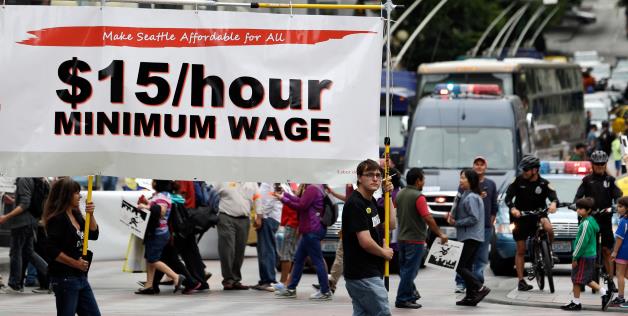On the same day Chris Christie was reelected governor in the blue state of New Jersey, voters approved a ballot box measure raising the minimum wage to $8.25 an hour. New Jerseyans also amended the state constitution to index the minimum wage to inflation. And in Seattle, voters want $15 to be the new minimum hourly wage.
Videos by Rare
(Read Related: Socialist candidate, $15/hr minimum wage both likely winners in Seattle)
Laymen argue about the minimum wage, yet economists have agreed about its consequences for some time. Nearly 80 percent of dismal scientists agree the minimum wage increases unemployment for young and unskilled workers, according to the popular textbook “Principles of Economics.”
The wage scale can be thought of as a ladder. Once someone can latch onto the bottom of it, he can begin to climb upward. What minimum wage laws do is saw off the bottom rungs on this ladder for far too many young, want-to-be workers.
Wages are determined by and large by a worker’s productivity. A smart businessman only hires those workers that he can make a profit from. A worker who produces $10 in output per hour at a wage of $9 an hour makes the entrepreneur $1 in profit.
Karl Marx saw the extra dollar as a form of exploitation. Economists have pointed out, however, that the entrepreneur needs an incentive to risk his own capital.
The most obvious way the minimum wage kills jobs is that workers who lack the skills to produce value above that of the minimum wage will not be employed. Who is going to pay a worker $7.25 an hour when he can only produce $5 an hour in output?
A worker who can only produce $5 an hour is going to have trouble gaining the skills to be worth the minimum wage if he has no work experience. I worked a dead-end job during my high school years and saw a steady stream of applicants with no work experience try to find work at my company. Their odds were close to zero.
Most low skilled and unskilled workers are youths. The youth unemployment rate is strongly inversely correlated with the value of the minimum wage. As the wage goes up, the job prospects for young, inexperienced workers go down.
America does not have a uniform minimum wage. Some states go with the federal minimum of $7.25 an hour, other states set their minimum wages higher and thus make it harder for the young to find work.
According to number crunching by economist Robert Murphy, states with minimum wages above the federal wage have a 25.2 percent youth unemployment rate. Those with the lower national wage have 21.5 percent youth unemployment. That’s still appallingly high, due in no small part to the national minimum wage, but it’s considerably better.
Some liberals spotlight Australia, which has a $16 an hour minimum wage and low youth (and overall) unemployment. This point is either an honest mistake or deliberate dishonesty, depending upon who the point comes from.
The Australia talking point overlooks the fact that Australia’s minimum wage is graduated depending on a worker’s age. The minimum wage for Australians under age 16 is $5.87; $7.55 for those age 16; $9.22 at age 17; $10.90 at age 18; $13.17 at age 19; and $15.59 at age 20.
Cost of living matters as well. Consumer prices are 39 percent lower in the United States than in Australia, rent prices are 48 percent lower, groceries are 36 percent lower. After adjusting for purchasing power, that actual minimum wage of Australians 18 and under comes out lower than the U.S. minimum wage.
Or take Norway, a country with no minimum wage whose McDonald’s workers earn the equivalent of $16-24 an hour. McDonald’s pays such wages there because the cost of living is much higher in Norway than in America.
I doubt the undeniable fact that the minimum wage causes youth unemployment would convince many liberals to oppose the minimum wage. With all the talk of “living wages,” their focus is clearly to help boost the incomes of the working poor, not teenagers.
There are other ways to help the working poor without sawing off the ladder for future workers. Expand the Earned Income Tax Credit, for instance. The Credit already raises the effective minimum wage of a single mother with two kids from $7.25 an hour to $10.44 an hour, a substantial increase.
As radical as abolishing the minimum wage altogether might sound, I would remind skeptics that the real minimum wage of those unemployed due to the law is zero.



